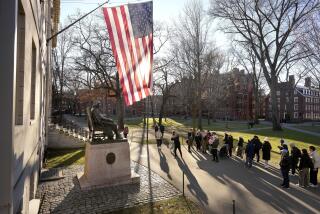Opinion: Blowback: Jonah Goldberg’s questioning of university rape story falls flat
In his recent column questioning allegations of brutal rape at a University of Virginia fraternity, Jonah Goldberg made clear -- though he didn’t say explicitly -- that he has never been in a fraternity. In fact, some quick research shows that his alma mater has not had any Greek presence on its campus for decades.
So it’s interesting to me, a recent college grad and alumna of a co-ed fraternity, that Goldberg feels he has such authority to discuss the veracity of Rolling Stone’s widely read account of a female student who tells of her systematic and brutal gang rape by seven men at the university’s Phi Kappa Psi chapter.
Goldberg raises questions about the rape survivor’s account that range from offhand (how did she know there were seven if the room was pitch black?) to naive: “The nicknames she hears -- ‘Armpit’ and ‘Blanket’ -- sound bizarre, even by fraternity standards.”
Goldberg’s dumbfoundedness is understandable. I thought it was pretty strange when I was given the pledge name “Sebastian” and placed on the mustache branch of the Galilean family in my fraternity. Other members of my organization had names like “Glenn Cocoa” and “Huff.” I can see why someone who knows nothing about the naming ceremonies of Greek organizations would find these whimsical handles odd.
Goldberg further shows his lack of familiarity with the problem of college rape when he calls the victim’s friends the “worst ... imaginable” for not immediately reporting her brutal assault. Here, Goldberg fails to appreciate the very real fear of being chastised for reporting a rape. I’m not saying that the friends were right in not reporting it, and I’m not making a judgment on whether or not the assault happened. But it’s clear that Goldberg’s cultural distance from modern campus life and disregard of the social consequences of reporting an assault render him inadequate to judge the veracity of a rape allegation.
Sadly, Goldberg’s piece is the type of ill-informed berating that makes victims of sexual assault afraid to come forward in the first place.
He evidently finds it hard to believe that seven young men not under the influence of drugs or alcohol would plan to rape a young woman and actually carry out such a heinous act. I have spent countless nights in deep conversation with friends who have been raped and have interviewed victims of sexual assault; I can assure Goldberg that people don’t have to be drunk to be rapists.
Remarkably, Goldberg refers to the “rape epidemic” -- yes, in scare quotes -- and criticizes the media for including this story in a broader discussion of what he thinks are questionable sexual assault statistics. Goldberg’s skepticism won’t prevent any campus rapes; what it risks doing, however, is to further discourage people from coming forward about their sexual assault.
The column ends with a call to the media to independently corroborate the Rolling Stone story. Goldberg is a columnist for a major newspaper and a nationally prominent commentator; he can sate his journalistic curiosity himself.
Diana Crandall is a master’s candidate at the USC Annenberg School of Journalism.
This piece is part of Blowback, our online forum for rebuttals to The Times. If you would like to write a full-length response to a recent Times article, editorial or Op-Ed and would like to participate in Blowback, here are our FAQs and submission policy.
Follow the Opinion section on Twitter @latimesopinion
More to Read
Start your day right
Sign up for Essential California for news, features and recommendations from the L.A. Times and beyond in your inbox six days a week.
You may occasionally receive promotional content from the Los Angeles Times.






